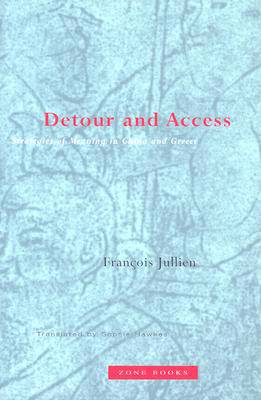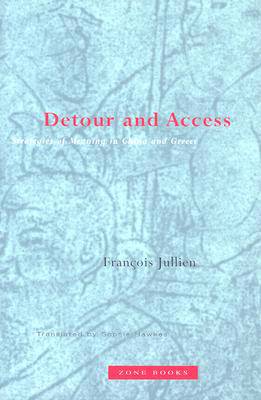
- Afhalen na 1 uur in een winkel met voorraad
- Gratis thuislevering in België vanaf € 30
- Ruim aanbod met 7 miljoen producten
- Afhalen na 1 uur in een winkel met voorraad
- Gratis thuislevering in België vanaf € 30
- Ruim aanbod met 7 miljoen producten
Zoeken
Omschrijving
In Detour and Access, François Jullien investigates the subtlety, strategy, and production of meaning in ancient and modern Chinese aesthetic texts and political events. Moving between the rhetorical traditions of ancient Greece and China, Jullien attempts no simple comparison between these two civilizations. Rather, he uses the perspective provided by each to gain access to one culture considered all too strange -- "It's all Chinese to me" -- and to another whose strangeness has been eclipsed by the assumption of its essential familiarity and originary position in Western civilization.
In Detour and Access, Jullien rereads the major texts and authors of Chinese thought -- The Book of Songs, Confucius's Analects, Mencius, and Lao Tse. He addresses the question of oblique, indirect, and allusive meaning in order to explore how literary and political techniques of detour give access to a world of symbolization and truth not characterized by simple modes of mimetic representation and static essentialism. Working indirectly, favoring the allusive expression over the direct one, the Chinese art of meaning appears as a complex mode of indication, open to multiple perspectives and variations, infinitely adaptable to situations and contexts. Concentrating on what is not said, or what is only conveyed through other means -- such as the distancing produced by allusive poetic and political motifs -- Jullien traces the ideological and aesthetic benefits and costs of a rhetorical strategy that lacks a fixed ontological perspective and absolute truth. Illuminating in its close textual readings, provocative and sophisticated in its theoretical insights and political analyses, Detour and Access provides a necessary refinement of ways of thinking about Chinese strategies of meaning as yet unanalyzed in the Western world.Specificaties
Betrokkenen
- Auteur(s):
- Vertaler(s):
- Uitgeverij:
Inhoud
- Aantal bladzijden:
- 424
- Taal:
- Engels
- Reeks:
Eigenschappen
- Productcode (EAN):
- 9781890951115
- Verschijningsdatum:
- 3/05/2004
- Uitvoering:
- Paperback
- Formaat:
- Trade paperback (VS)
- Afmetingen:
- 150 mm x 226 mm
- Gewicht:
- 657 g

Alleen bij Standaard Boekhandel
+ 81 punten op je klantenkaart van Standaard Boekhandel
Beoordelingen
We publiceren alleen reviews die voldoen aan de voorwaarden voor reviews. Bekijk onze voorwaarden voor reviews.











